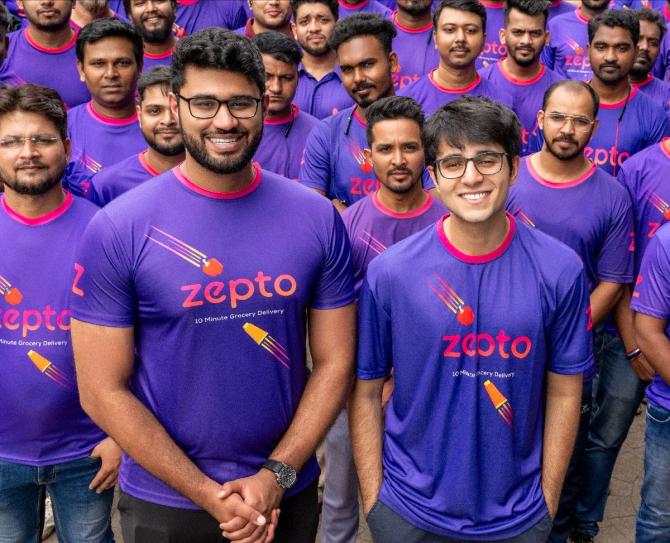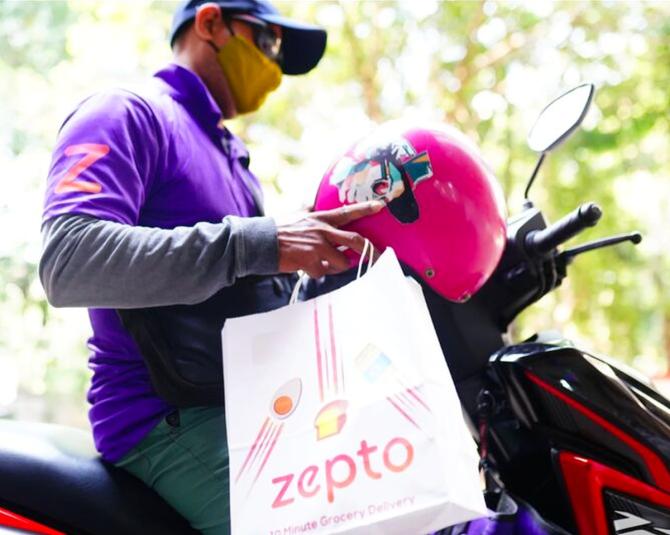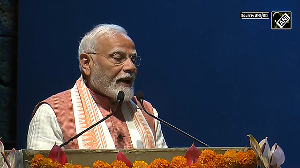'Domestic investors are opening up to the idea of high-growth Internet companies as a pool of value creation.'
'They like the execution that they see with Zepto, and for us, that is the most important factor.'

Aadit Palicha, co-founder and chief executive officer of quick commerce firm Zepto, says the latest $350 million fundraise is one of the largest ever from domestic investors.
This will allow the company to give more shareholding to Indian investors as it eyes an IPO sometime next financial year.
"Quick commerce is going to create many more D2C brands than e-commerce today. E-commerce largely played in big-ticket categories like smartphones, fashion, and large-scale electronics, which are capital intensive and have a high barrier to entry. However, to build a beverage, packaged food, or nutraceutical brand is a lot easier, with much lower barriers to entry," Palicha tells Aryaman Gupta and Shivani Shinde/Business Standard in a video interview.
What is making investors queue up to invest in Zepto?
Earlier this financial year, we resoundingly proved the unit economics of our model.
We turned around about 70 per cent of our dark stores to be fully earnings before Ebitda free cash flow positive, including all back-end supply chain and software costs.
Those stores are also turning free cash flow positive faster -- now in eight months, down from 23 months earlier.
From a return on equity perspective, it used to take us about Rs 3.9 crore (Rs 39 million) in capex and operating burn for a store to turn profitable. Now it only takes Rs 1.5 crore (Rs 15 million).
We've been able to turn our stores profitable rapidly, even as we scaled from zero to $1 billion gross merchandise value (GMV) in two-and-a-half years. This was seven months ago.
Seeing this trajectory, our investors urged us to invest in the business, which is why we were able to raise over $1 billion quickly.
Since April-May, we've been multiplying our dark store count, and from the base of $1 billion (GMV), we have grown well over twofold in a short period.
We are the fastest-growing Internet company in India now, and the economic profile still makes sense.
As long as our mature stores continue to turn profitable and we are only losing money due to store launches, that is a good place to be.
There are very few Indian consumer companies that have that kind of return profile for incoming investors.

What is Zepto's shareholding pattern post-fundraise? Would you also be raising more funds, especially before the IPO?
We are over 30 per cent domestically owned after the fundraise.
Kaivalya Vohra (co-founder) and I own almost 20 per cent of the company, and we will go public with around that share still with us.
We are not planning to raise another fund. We don't have the clear go-ahead on that yet. But it might end up happening in a quarter or two.
We have around $1.3 billion in cash balance, so we don't need more primary capital.
We would mostly raise secondary capital to bring on more high-quality domestic investors before the IPO.
What is Zepto's current scale? And have cash burns increased significantly?
We are operating over 600 dark stores and doing close to around 900,000 orders a day.
Our average order value (AOV) has grown: we are expecting to touch Rs 540 to Rs 550 by next month, up from Rs 450 about eight months ago.
We have crossed 6 million Zepto Pass (membership plan) subscribers. We have also gone from 6,000 to 14,000 SKUs, and we will continue to multiply that over the next 12 months.
Cash burn is primarily due to capex and working capital for our operational setups.
We are launching hundreds of stores each quarter and getting the requisite return on investment from that.
The Ebitda curves of each of the stores we are launching are getting better than those we launched in the past.
Putting in that upfront investment today, we are looking at a very healthy balance sheet.
It (cash burn) is in our control right now, and is reflecting in the rapid scale that we are delivering today.
We are going to get to profit after tax breakeven on a much higher base than this year, within the next financial year. We could very well be near that milestone right before the IPO.
FMCG firms are reporting a slowdown in urban consumption. What have you observed?
We are not seeing consumers slow down spending. On the contrary, we are seeing an increase.
The middle class in urban India is not shrinking; it is expanding. What we see is that big players are losing share to innovative Indian entrepreneurs who are building FMCG startups.
We have thousands of such new-age brands on our platform. That is where the (consumer) spend is going.
For instance, there are startups like Go Zero in ice cream or Let's Try in chips and snacking, which are taking away shares from established brands and have built multi-Rs 100 crore (Rs 1 billion) brands in a very short period of time.
We are seeing that the consumer in urban India is expanding their spending on such brands.
Quick commerce is going to create many more D2C brands than e-commerce today.
E-commerce largely played in big-ticket categories like smartphones, fashion, and large-scale electronics, which are capital intensive and have a high barrier to entry. However, to build a beverage, packaged food, or nutraceutical brand is a lot easier, with much lower barriers to entry.
Quick commerce is skewed towards these types of brands. We will create 10x more Mamaearths and BoAts in the next three or four years.

Lately, quick commerce has been in the spotlight due to its impact on kirana stores. There is also concern that the current fundraise allows firms like yours to engage in predatory pricing. What is your comment on this?
We have $1.3 billion in cash balance. If they believe that 80 per cent of that is going to unsustainable customer acquisition strategies, that figure is inaccurate.
It would assume that we would spend a billion dollars in the next 12 months, which is not happening.
Secondly, the same data quoted by CAIT (Confederation of All India Traders) from a Datum Intelligence report, which says quick commerce has taken almost $5 billion in sales from kirana stores, also states that $46 billion of new consumption has been added to India in the last year.
If that is the case, then where did the remaining $41 billion go? Mathematically, it is impossible for us to take business away from kirana stores.
Over the next five years, the consensus among analysts like Datum Intelligence, Goldman Sachs, CLSA, BCG, Redseer, and even Invest India, is that the Indian grocery consumption market will add $200 billion to $250 billion in sales.
Even if quick commerce grows 1,500 per cent over that period, we will be less than half of the incremental consumption that gets created.
In terms of predatory pricing, only 0.2 per cent of the units sold on the Zepto platform were below the cost price of the manufacturer in FY24. There is no real data behind it (allegations).
It is hyperbole, in a manner that is counterproductive to the value that we are creating.
The regulator has indicated concerns about food safety and expiry dates on products among quick commerce players.
We are working with the government in good faith to sort that out.
Quick commerce is seen as an urban phenomenon. What is your expansion strategy into tier II+ markets?
We are live in about 20 cities, having recently launched in Nashik, Chandigarh, Ahmedabad, Rajkot, and Surat.
We are about to launch in Tier-II cities like Vadodara and Kurukshetra. We are in expansion mode right now. The demand we are seeing is very exciting.
The time taken to hit 1,000 orders per day is faster in Tier-II and -III cities than in Tier-I regions because customers in these areas don't have many (offline) options and services available to them.
There is also a cost arbitrage. Rent, delivery, manpower, and back-end supply chain costs are cheaper.
We will go beyond quick commerce being an urban phenomenon in the next few months.
Do you think there is more appetite among domestic investors for another large round?
It's hard to say. We haven't kicked off the process (of raising funds), and we don't know what the demand will be like. But if we keep scaling the way we are, hopefully, there should be demand.
Domestic investors are opening up to the idea of high-growth Internet companies as a pool of value creation.
They like the execution that they see with Zepto, and for us, that is the most important factor.
Feature Presentation: Rajesh Alva/Rediff.com












 © 2025
© 2025